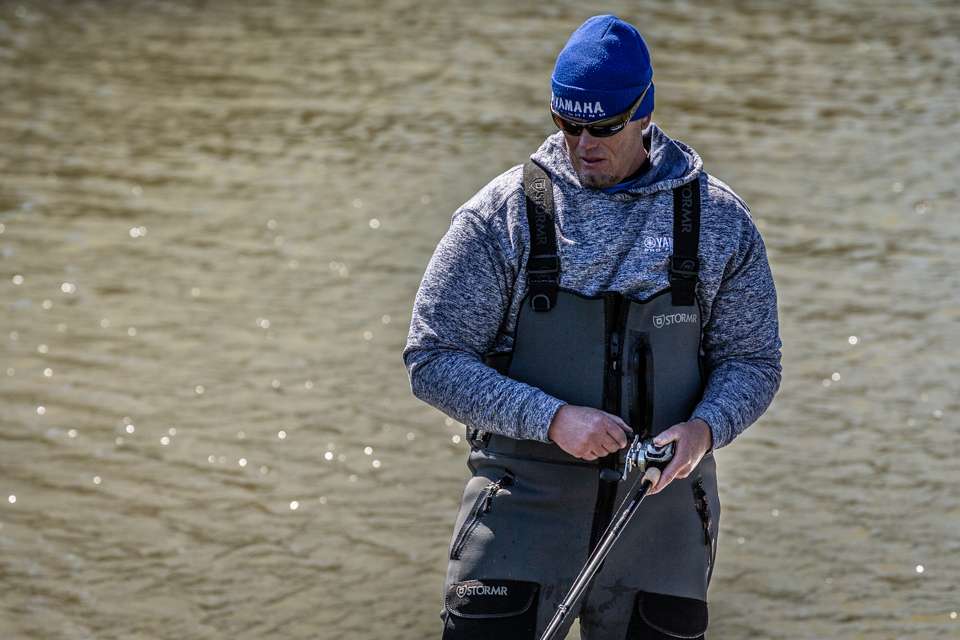
BIRMINGHAM, Ala. – As Keith Combs pulled forward in the drive-thru line at Jack’s fast food restaurant in Guntersville at 5:45 this morning, boat in tow, all he wanted was a biscuit. The last thing he needed was the questioning face of an intrepid reporter, less than 12 hours after he’d weighed in a subpar four bass for 7 pounds, 12 ounces on the BJCC stage.
My sympathetic side thought to leave him alone, but the persistent voice of an imaginary Steve Bowman perched on my shoulder forced me to ask how he planned to right his ship.
“I really don’t think I’m going to do anything different,” he replied. “They just didn’t bite yesterday. I know that there’s a 20-pound bag there.”
He was wrong on one count, or perhaps he was sandbagging: That “20-pound bag” turned out to weigh 23 pounds, 10 ounces, the biggest limit of the day, and second for the tournament so far behind only Hank Cherry’s massive Day 1 catch of 29-03. It moved him up 30 places, from 43rd into 13th, and arguably into contention.
He knew they were there, and he made them pay for it.
Of course, just knowing the fish are there doesn’t mean they’re catchable, as Combs no doubt remembers from Friday’s comparative debacle. Today the non-imaginary Bowman and I started on Clent Davis, who was tied with John Crews for second on Friday with 21-08. He had nearly 20 bites in the first half hour, most of them short-strikers or sub-legal fish, but with the occasional keeper mixed in. When he added his fourth to the livewell, the bite shut off.
It didn’t just slow to a trickle, as sometimes happens. It went dead.
Davis remained calm and rotated through his spots in an up lake creek carefully. At one point he revisited the zone where he’d had all of those strikes, including three on a single cast, but now he might as well have been fishing on the moon. Except for the occasional strand of underwater vegetation, nothing pulled back on his line.
“It would scare you to know how many bass are down there,” he said.
In the end, his fortune was the reverse of what Combs experienced: He weighed only those four early fish and fell from second to 17th place. Like Combs, he’ll fish tomorrow with an outside chance to win if lots of dominos fall, but likely asking himself the whole day why the fish in his area didn’t bite equally well on both Friday and Saturday.
Toward the end of the day we followed Stetson Blaylock into a cove where we’d seen him catch four fish on Friday afternoon, while missing several others, but despite patient seining of that productive stretch – one that should have had more bass moving into it by the hour – he couldn’t add to his solid limit. A camera boat sitting nearby us confided that Blaylock had seen huge numbers of fish on his Garmin Panoptix units but simply could not get them to commit, no matter what lure he offered or how he antagonized them.
Knowing the location of a “wad” of fish – the term used by both Davis and Blaylock – is both a blessing and a curse. It’s a blessing because you know that you’re not fishing dead water, but it can be a curse when you might as well have been casting in fish-free territory. It has the potential to play with your mind, and to question what are otherwise good decisions. The pros have been exceptional at finding massive concentrations of big bass for years, but in this era of down-looking, side-looking and forward-looking sonar, their abilities have increased exponentially. That means that the excuses and rationales for those days when you don’t catch them have been eliminated. No matter how advanced we get, there are still variables we cannot control.
Even if an angler knows that the winning school of fish sit under his boat, on a fertile lake like Guntersville, he cannot help but second-guess himself when they don’t fire up. This Classic, unlike many others, will not be won on a little-known lure or in a secret spot. It will be won, like all of them, by the angler who manages to get the most big fish to chew. Sounds easy, but on a highly pressured lake it’s nowhere near as simple as getting a tired angler to wolf down an early morning biscuit.

